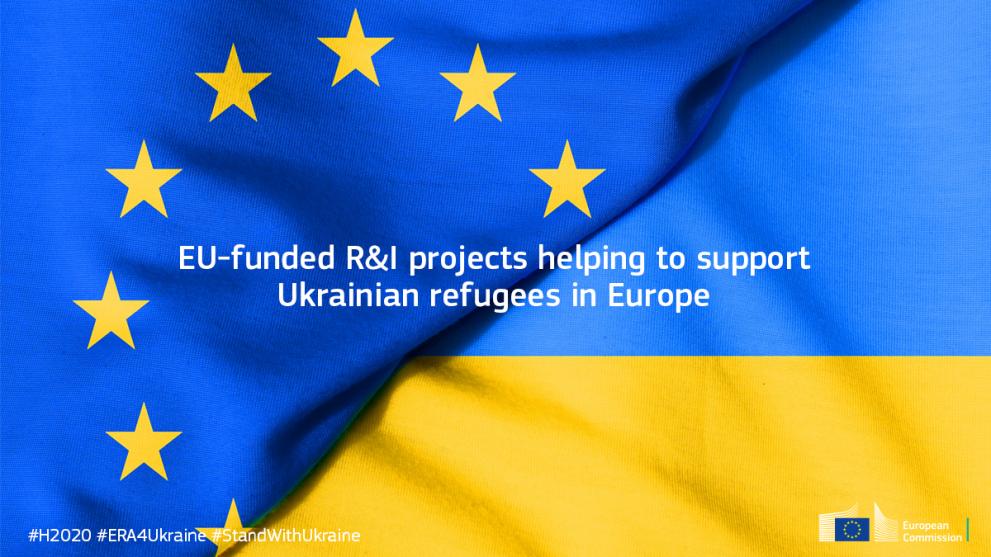
Europe’s united front
It has been one year since Russia invaded Ukraine. This unprovoked military aggression has brought war back to Europe and with it, the greatest refugee crisis in Europe since 1945.
As the Russian aggression continues, the number of refugees fleeing Ukraine has risen to 6.6 million as of February 2023. Together with internally displaced people in Ukraine, roughly a quarter of its population has had to leave their homes because of the war.
The EU has faced Russian aggression with a united front. Since Russia invaded Ukraine, the EU and member states have provided €17 billion in support for Ukrainian refugees. The EU has also triggered the Temporary Protection Directive, allowing Ukrainians to work for up to three years in host countries unhindered.
Ukrainians now work and study across the EU; creating lives for themselves whilst also giving back to their host countries. However, to ensure refugees can do so effectively in the short and long-term, research and innovation in socio-political science must play an important role. The following research and innovation initiatives are just a sample of the EU’s commitment to helping Ukrainians establish themselves, safeguarding their interests even once the war has ended.
One-stop-shop to help Ukrainian researchers
Fleeing a war to then settle in a new country poses immense challenges, such as finding a job or getting your qualifications recognised. This is why the European Commission has created the European Research Area for Ukraine (ERA4Ukraine) portal, a one-stop-shop for information and support services to Ukraine-based researchers and researchers fleeing Ukraine. The portal brings together initiatives from the national and EU-level as well as from non-governmental organisations. It aims to help affected researchers find housing and job opportunities, facilitate the recognition of their diplomas, and offers other services. The ERA4Ukraine portal is launched on the existing EURAXESS network, which supports researchers by connecting more than 600 centres and 43 national portals across the EU Member States and countries associated to Horizon Europe.
Find out more about ERA4UKRAINE
EU to fund 124 displaced Ukrainian researchers
Yesterday, the European Commission announced that it will fund 124 displaced researchers from Ukraine through the MSCA4Ukraine fellowship scheme. Funded under the Marie Skłodowska-Curie Actions, the scheme was launched last year following the Russian invasion of Ukraine. 13 doctoral candidates and 11 postdoctoral researchers will now be able to continue their important work. The selected PhD candidates and postdoctoral researchers will carry out their projects in 21 countries, whilst maintaining links with their research communities in Ukraine.
Find out more about this MSCA4Ukraine call.
Solidarity in Diversity
History has shown that the arrival of refugees can cause resentment in host countries, diminishing chances for a successful local integration. Under the Marie-Sklodowska-Curie-Actions programme, the EU-funded SOLiDi project is attempting to counter this. The project has developed a programme to train 15 early-stage researchers in relevant theories, research methods and ethics from a variety of disciplines. Ultimately, the project will provide professionals and institutions with insights and instruments for building cohesive European societies.
Find out more about SOLiDi
Breaking down barriers
The EU-funded SIRIUS project is working to facilitate refugees finding jobs in host countries. The project has studied how various conditions in hosting countries enable or function as barriers to migrants’, refugees’ and asylum seekers’ integration in the labour market. This includes countries’ political-institutional make-up, societal factors, as well as individual-related conditions of both the local population and refugees. The project has launched an app (Workeen) with the aim of help refugees and migrants enter the labour market.
Find out more about SIRIUS
Synergy in policy recommendations and key definitions
PROTECT, ASILE and VULNER are three EU-funded projects that were researching the topics of migration and asylum. The projects were providing support to refugees in Europe before Russia’s invasion of Ukraine but now their research is relevant for the millions of Ukrainian refugees and internally displaced peoples. These projects research a range of topics. ASILE is researching whether global human rights standards are being applied in different asylum systems, amongst other topics. VULNER is addressing how these global asylum laws shape and address the vulnerabilities of refugees. PROTECT will research how to support border guards with new technologies.
Find out more about PROTECT, ASILE, VULNER
A long road ahead
The EU has learnt lessons from its disunity in the face of the refugees and migrants arriving in 2015. The road to rehabilitate Ukrainian refugees will be long however, EU-funded research will stand by their side.
The above are just a few of the EU-funded programmes, initiatives, and projects that support Ukrainian refugees. Find out more on the Commission’s support for Ukrainian research and innovation.
*This article was updated on 24 February 2023
Details
- Publication date
- 29 April 2022 (Last updated on: 24 February 2023)
- Author
- European Research Executive Agency
